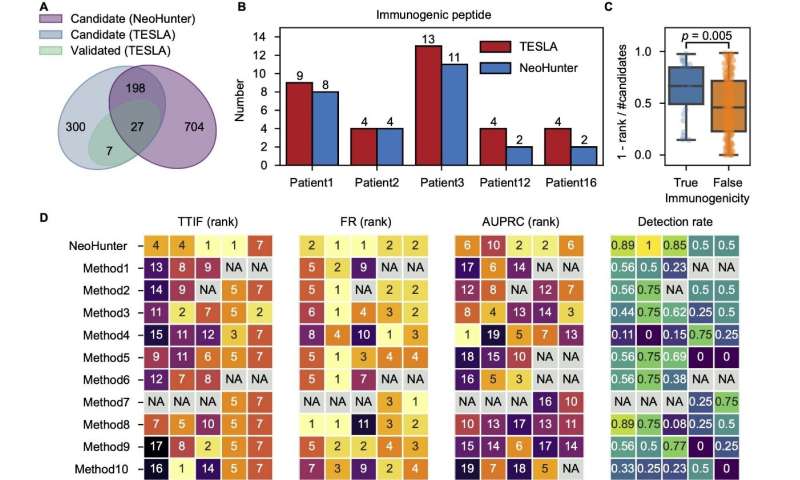NeoHunter: Flexible software for systematically detecting neoantigens from sequencing data

Complicated molecular alterations in tumors generate various mutant peptides. Some of these mutant peptides can be presented to the cell surface and then elicit immune responses, and such mutant peptides are called neoantigens. Accurate detection of neoantigens could help to design personalized cancer vaccines.
Although some computational frameworks for neoantigen detection have been proposed, most of them can only detect single-nucleotide-variant- (SNV) and indel-derived neoantigens. In addition, current frameworks adopt oversimplified neoantigen prioritization strategies. These factors hinder the comprehensive and effective detection of neoantigens.
Recently, Quantitative Biology published a software article titled "NeoHunter: Flexible software for systematically detecting neoantigens from sequencing data." NeoHunter is a flexible software that can systematically "catch all" neoantigens from next-generation sequencing (NGS) data. It can detect neoantigens generated from various molecular alterations, including SNVs, indels, gene fusions, and aberrant splicing, and flexibly supports multiple types of NGS data.
The philosophy of NeoHunter is consistent with the biological process of neoantigen-induced immune responses. First, NeoHunter detects different types of molecular alterations, including SNVs, indels, gene fusions, and aberrant splicing, from NGS data of cancer patients. NeoHunter also decodes the types of human leukocyte antigen (HLA) alleles. Then, NeoHunter estimates the binding level between mutant peptides and HLA alleles.
A peptide–HLA pair estimated to be in strong binding indicates that the peptide has great potential to be presented by the HLA allele and form peptide–major histocompatibility complex (pMHC). Finally, NeoHunter evaluates the immunogenicity of TCR recognition on pMHC complexes by evaluating the similarity between the query peptide and confirmed antigens or combining advanced deep-learning-based models, and thereby confirms candidate neoantigens.
Authors applied NeoHunter to cancer patients collected from Tumor Neoantigen Selection Alliance (TESLA). TESLA validated some neoantigen candidates in vitro and confirmed 34 candidates to be immunogenic.
NeoHunter detected 27 validated neoantigens and achieved high performance among several evaluation metrics compared with existing neoantigen detection methods. SNV- and indel-derived neoantigens accounted for 90% of the top 100 candidate neoantigens while neoantigens from aberrant splicing accounted for 9%. Gene fusion-derived neoantigens were detected in one patient.
These results suggest that different types of mutations should be thoroughly considered when designing cancer vaccines against neoantigens. In addition, the authors analyzed the impact of mutation annotation tools and NGS sequencing depth on neoantigen detection. NeoHunter is a comprehensive and effective tool for neoantigen detection, and is potentially valuable for advancing the development of personalized cancer vaccines.
More information:
Tianxing Ma et al, NeoHunter: Flexible software for systematically detecting neoantigens from sequencing data, Quantitative Biology (2024). DOI: 10.1002/qub2.28
github.com/XuegongLab/NeoHunter
Provided by Frontiers Journals